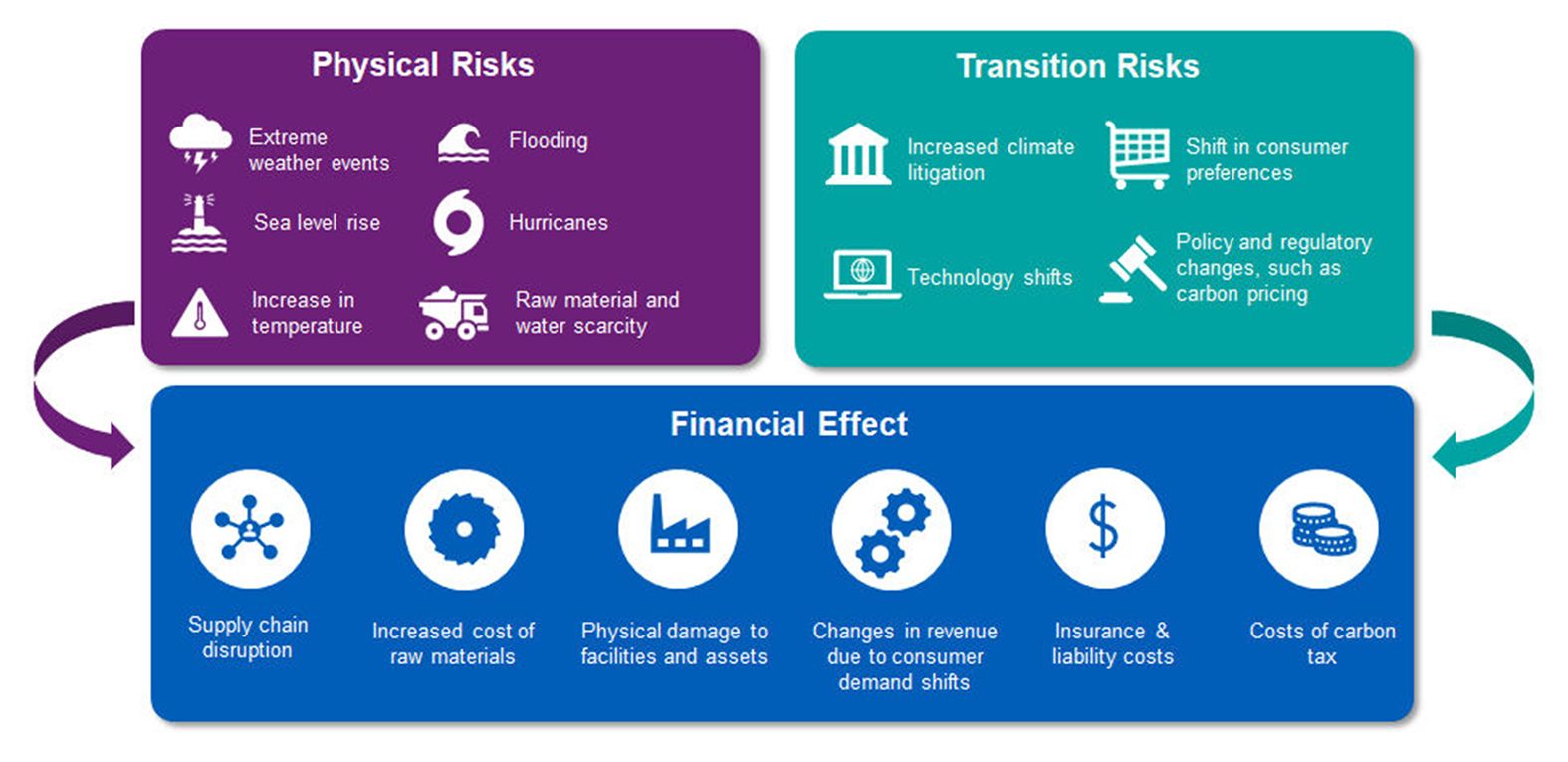Climate risks and opportunities: Dealing with financial disclosures and reporting
Climate change risk was considered the fifth biggest risk to growth over the next three years.
Climate change risk was considered the fifth biggest risk to growth over the next 3 years.
In the KPMG 2021 CEO Outlook Pulse Survey, climate change risk was considered the fifth biggest risk to growth over the next three years. Acknowledging the threat of climate risk by companies is one thing. Knowing how to size this risk, and adapt and thrive, is another.
KPMG, along with global law firm Eversheds, polled senior executives from 500 of the world’s leading companies for our survey Climate change and corporate value: What companies really think. Three-quarters of leaders surveyed admit they need to improve their ability to deal with climate change risks, yet a key finding from this report is that many companies believe that they lack the skills and expertise to pursue their net-zero carbon objectives.
In the first instance, failure to recognize, measure and disclose climate risk may ultimately lead to problems with both debt and equity investors, as there is increasing awareness of the reality of climate risk from these stakeholders and the impact on their own investments. Moreover, regulators are paying closer attention to climate risk and how they are reported. In Thailand, The Securities and Exchange Commission (Thai SEC) has declared support for the Task Force on Climate-Related Financial Disclosures (TCFD) by becoming an official TCFD supporter. Thai SEC encourage incorporation of climate-related risks into strategic planning and risk management and follow international standard disclosure guidelines. In addition, the One Report also contains sections on sustainability and Environmental, Social and Governance (ESG) disclosure. Ultimately, climate risk needs to be seen as a financial risk because it can impact business models, long term cash flows and profitability. In turn, this can impact the way assets and companies are valued.

However, with risks, also come opportunity. Once climate risks are evaluated, measured and steps are taken to mitigate or minimized, opportunities also arise. Restructuring of value and supply chain, making use of changing consumer behavior and awareness, as well as utilizing technology can create market, technology and reputational opportunities. By creating better awareness of the risks and opportunities from climate change through business and financial disclosures, companies can drive a more efficient allocation of capital to their mitigation or enablement, improving financial stability.
In terms of business and financial reporting, users of financial statements want to understand how climate-related matters impact companies, including their business models, cash flows, financial position and financial performance. They need information to assess how the company is managing these climate-related risks and opportunities, and the impact on the company’s long-term prospects. IFRS Standards do not refer explicitly to climate-related risks or climate-related matters, but they implicitly require relevant disclosures in the financial statements when climate-related matters considered in preparing the financial statements are material. Companies should stay abreast of standard setting for both sustainability and financial reporting developments since the International Sustainability Standards Board (ISSB) will soon release proposals for IFRS Sustainability Disclosure Standards on climate-related disclosures and general disclosure requirements. Some of the actions that companies can take to kick-start financial disclosures and reporting includes:
- Consider climate-related risks and opportunities and their financial impacts when preparing financial statements.
- Consider materiality from both a quantitative and qualitative perspective in relation to disclosures of key judgements and assumptions related to climate risk.
- Provide clear and robust disclosures, especially of the key judgements and estimates affected by climate-related matters.
- Ensure consistency of assumptions used in relevant areas of the company’s financial statements and that they are in sync to the extent appropriate with information related to climate-related risks discussed elsewhere in the annual report. Consider providing additional explanations in the annual report where inconsistencies arise.
- Consider relevant regulatory guidance.
- Stay abreast of sustainability and financial reporting developments.
KPMG Climate Change and Sustainability Services
KPMG in Thailand’s Climate Change and Sustainability Services can help you understand and address social, economic and environmental challenges. Our sustainability services practice is part of a global network comprising of more than 500 dedicated sustainability professionals, delivering advisory and assurance services in more than 50 countries. Our global network offers more than 30 years of sustainability knowledge and experience – all of which can be leveraged to support your business needs. Our service offerings have been developed to assist you in your sustainability journey, from initial integration to obtaining external assurance for public sustainability disclosures. We have extensive experience working with organizations in a wide array of sectors, including financial services, oil and gas, government, transport and consumer goods.
About KPMG
KPMG is a global organization of independent professional services firms providing Audit, Tax and Advisory services. We operate in 146 countries and territories and in FY20 had close to 227,000 people working in member firms around the world. Each KPMG firm is a legally distinct and separate entity and describes itself as such.
KPMG International Limited is a private English company limited by guarantee. KPMG International Limited and its related entities do not provide services to clients.
About KPMG in Thailand
KPMG in Thailand, with more than 2,000 professionals offering Audit and Assurance, Legal, Tax, and Advisory services, is a member firm of the KPMG global organization of independent member firms affiliated with KPMG International Limited, a private English company limited by guarantee.
For media inquiries, please contact:
Ploi Phayakvichien
ploi@kpmg.co.th


